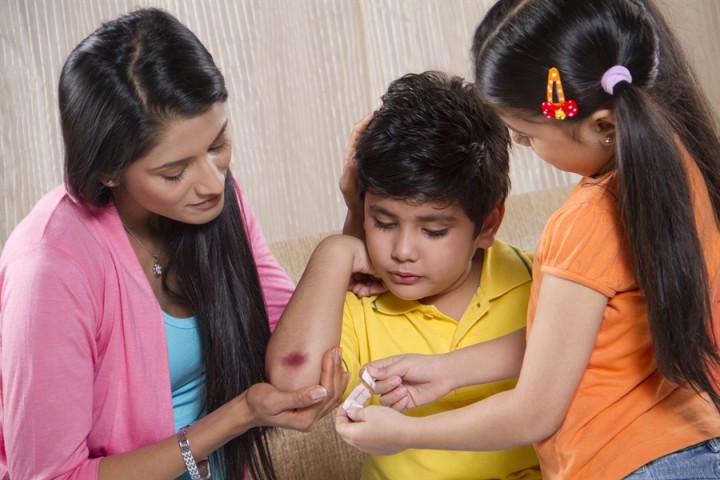
Photo: Imagesbazaar
Bumps and bruises, cuts and scrapes go hand in hand with childhood. Nobody gets through childhood without some sort of accident. Household injuries are one of the top reasons kids under age 3 visit the emergency room, and nearly 70% of the children who die from unintentional injuries at home are 4 years old and under.
A 2012 report in the journal Pediatrics estimated that nearly 65,000 children were treated in U.S. emergency rooms for bouncy-house-related injuries between 1990 and 2010.UK’s Mirror says that most parents – two-thirds, in fact are ill-equipped when it comes to dealing with such accidents. They are clueless as to what actions they should take in such circumstances. It is imperative to get yourself well acquainted with the common accidents that do occur and what you need to do to keep your child safe. Here are some tips:
Swallows harmful substance
Alcohol, cleaning liquids and even certain plants are considered under the harmful substances label. The first thing to do in such a situation is to find out exactly what they’ve consumed, how much, and how long ago. Rush the child to the hospital and take the consumed substance with you.
Child chokes and is not to breathe
When a child chokes, he may hold his neck or chest and won’t be able to breathe or speak. The first thing to do is to give up to five blows to the back of the child, hitting with the heel of your hand between the child’s shoulder blades. This should be sufficient to remove whatever is stuck in the child’s airway.
Suffers a burn
If your child suffers a burn, immediately attend the child to prevent him from lasting scarring and nerve damage. Hold the burnt area under cold running water for at least 10 minutes, even if your child expresses discomfort. After this, allow the burnt area to cool and cover it with a clean plastic bag. This insulates the burn from the air, preventing further damage, and plastic covers the area without sticking to the skin. Don’t delay medical treatment.
Bumps head
Babies and even children often bump into things. It’s part of growing up. However, some injuries are severe. If your child bumps his head and there is swelling and pain, apply something cold. You can use ice cubes wrapped in a cloth (or a handkerchief), but never expose the skin directly to ice. Losing consciousness, vomiting or feeling drowsy are signs of something serious such as a concussion. Take your child to a doctor immediately.
Has an allergic reaction
If your child has an allergic reaction, you must act quickly. An allergic reaction may look harmless but a delay in healing the allergy could potentially be fatal. Take your child immediately to a doctor, who would administer anti-allergy drugs. Make sure you know the cause of the reaction, or exactly what your child was doing, playing with or eating before it happened.
Baby is unconscious and not breathing
Babies are delicate and you’ll have to be more careful. First confirm whether the baby is breathing by laying him on his back and observing his chest. Then send for medical aid. To carry out rescue breaths, tilt the child’s head back, put your mouth over his, pinch his nose and blow into his mouth. To give chest compressions, push firmly in the middle of the chest using two fingers only. Keep doing this till medical help arrives.
Accidents cannot be completely avoided, but its occurrence can be. To put a stop to accidental injuries to children, adults should pay more attention to home safety. They should clear any hidden “hazards” at home and educate children about safety. If accidents happen, it is vital to stay calm and call for help at once.
Please like FamiLife’s page on Facebook so that you get all our articles and others may find us.
Disclaimer: Medical content and advice published on this site is provided for information purposes only and is not a substitute for a consultation with a licensed physician or the reader’s discretion. Although FamiLife.in verifies all information with reputable sources, the contributors and publishers accept no responsibility for any actions taken by readers based on the information provided here. FamiLife.in recommends that you always consult a licensed medical professional in health matters.
